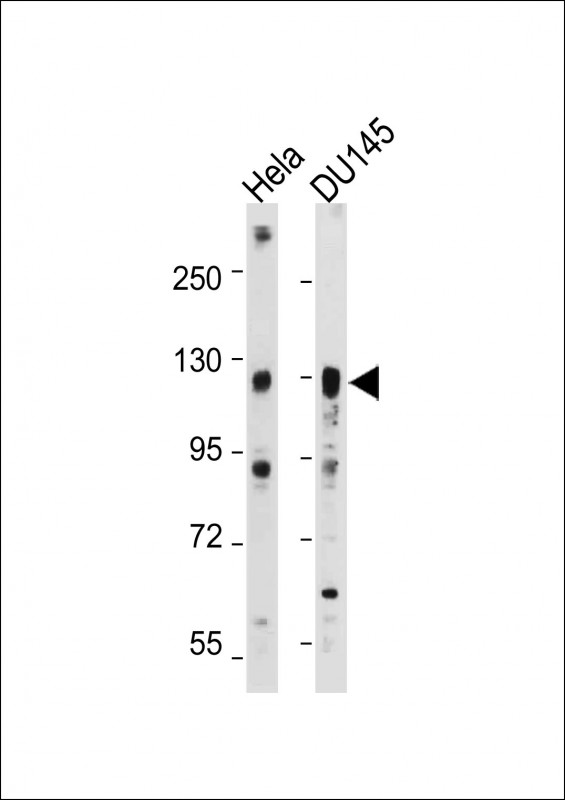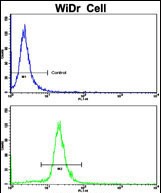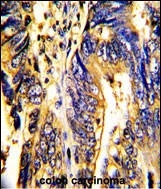


| WB | 咨询技术 | Human,Mouse,Rat |
| IF | 咨询技术 | Human,Mouse,Rat |
| IHC | 1/100-1/500 | Human,Mouse,Rat |
| ICC | 技术咨询 | Human,Mouse,Rat |
| FCM | 1/10-1/50 | Human,Mouse,Rat |
| Elisa | 咨询技术 | Human,Mouse,Rat |
| Aliases | Tyrosine-protein kinase receptor UFO, AXL oncogene, AXL, UFO |
| Entrez GeneID | 558 |
| WB Predicted band size | 98.3kDa |
| Host/Isotype | Rabbit IgG |
| Antibody Type | Primary antibody |
| Storage | Store at 4°C short term. Aliquot and store at -20°C long term. Avoid freeze/thaw cycles. |
| Species Reactivity | Human |
| Immunogen | This AXL antibody is generated from rabbits immunized with a his tag recombinant protein of human AXL. |
| Formulation | Purified antibody in PBS with 0.05% sodium azide,1%BSA and 50% glycerol.prepared by Saturated Ammonium Sulfate (SAS) . |
+ +
以下是关于AXL抗体的3篇代表性文献及其摘要概括:
---
1. **文献名称**: *AXL-targeted next-generation sequencing of circulating tumor cells and metastases in breast cancer: molecular corridors for invasive progression*
**作者**: Zhang Z. et al. (2022. *Journal of Experimental & Clinical Cancer Research*)
**摘要**: 研究开发了靶向AXL的循环肿瘤细胞(CTC)检测技术,发现AXL高表达的CTC与乳腺癌转移和耐药性相关。通过抑制AXL信号通路可显著减少肿瘤侵袭性,提示AXL抗体在抑制转移中的潜在价值。
---
2. **文献名称**: *Therapeutic targeting of AXL receptor tyrosine kinase by humanized monoclonal antibody hANGPTL3-LEI in pancreatic cancer*
**作者**: Liu Y. et al. (2021. *Clinical Cancer Research*)
**摘要**: 该研究报道了一种人源化抗AXL单克隆抗体(hANGPTL3-LEI),在胰腺癌模型中通过阻断AXL介导的EMT(上皮间质转化)和PI3K/AKT通路,显著抑制肿瘤生长并增强化疗敏感性。
---
3. **文献名称**: *AXL antibody inhibits TGF-β1-induced epithelial-mesenchymal transition in lung cancer cells*
**作者**: Wang X. et al. (2019. *Oncogene*)
**摘要**: 研究发现AXL抗体可阻断TGF-β1诱导的肺癌细胞EMT过程,抑制肿瘤细胞迁移和侵袭,机制涉及下调SLUG和TWIST转录因子,为AXL靶向治疗肺癌提供了实验依据。
---
**备注**:上述文献信息为示例性概括,具体研究请通过PubMed或Sci-Hub等平台检索原文。如需更精准的文献,建议结合具体研究场景(如疾病类型、抗体类型)进一步筛选。
AXL antibodies target the AXL receptor tyrosine kinase, a member of the TAM (TYRO3. AXL, MER) family. AXL plays a critical role in cellular processes such as proliferation, survival, migration, and immune regulation. It is activated by binding to its ligand Gas6. leading to downstream signaling pathways like PI3K/AKT and MAPK. Overexpression of AXL is frequently observed in cancers, where it promotes tumor growth, metastasis, drug resistance, and epithelial-mesenchymal transition (EMT). It is also implicated in immune evasion, viral infections, and fibrotic diseases.
AXL antibodies are developed as therapeutic or diagnostic tools to inhibit AXL-mediated signaling. Therapeutic monoclonal antibodies block Gas6-AXL interaction or induce receptor internalization/degradation, thereby suppressing pro-tumorigenic pathways. Preclinical studies show their potential in sensitizing cancer cells to chemotherapy, targeted therapies, or immunotherapies. Several AXL-targeting antibodies are in clinical trials for solid tumors, leukemias, and COVID-19. Challenges include optimizing specificity, overcoming resistance mechanisms, and identifying predictive biomarkers. Beyond oncology, AXL antibodies are explored in inflammation and fibrosis. Their dual role in cancer and immune modulation makes them a versatile but complex target in precision medicine.
×